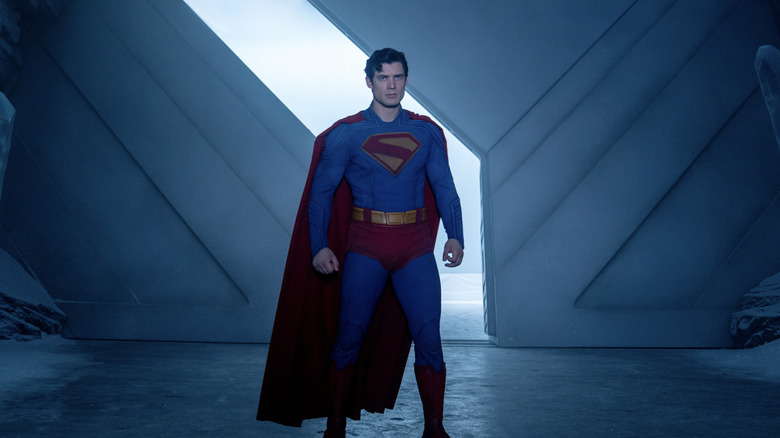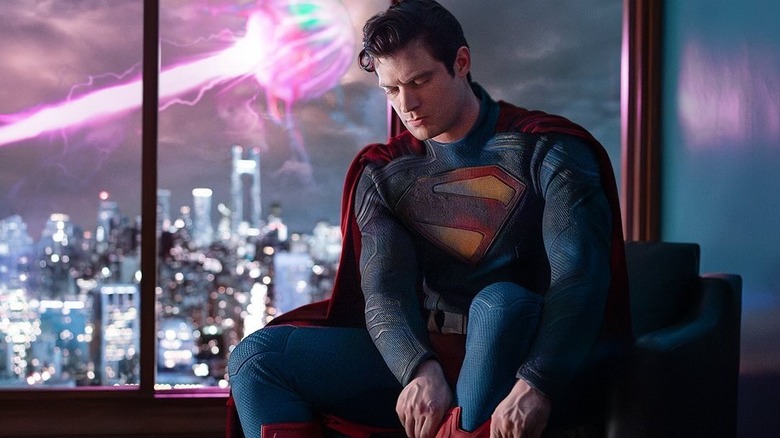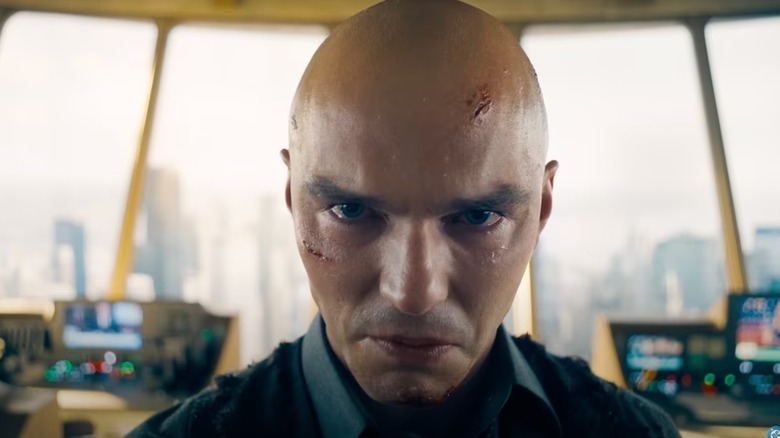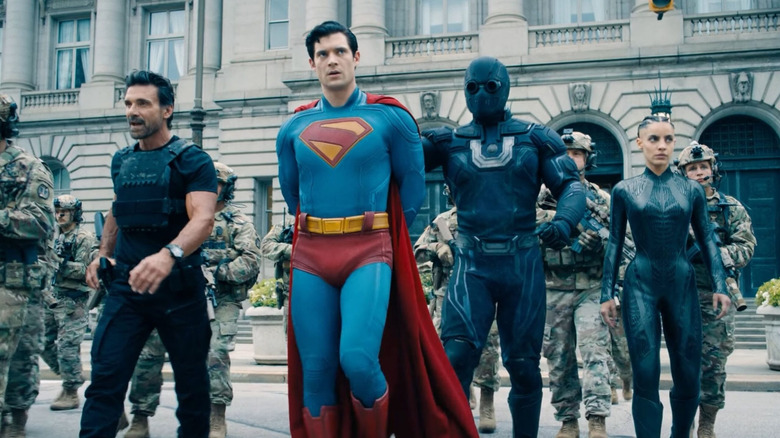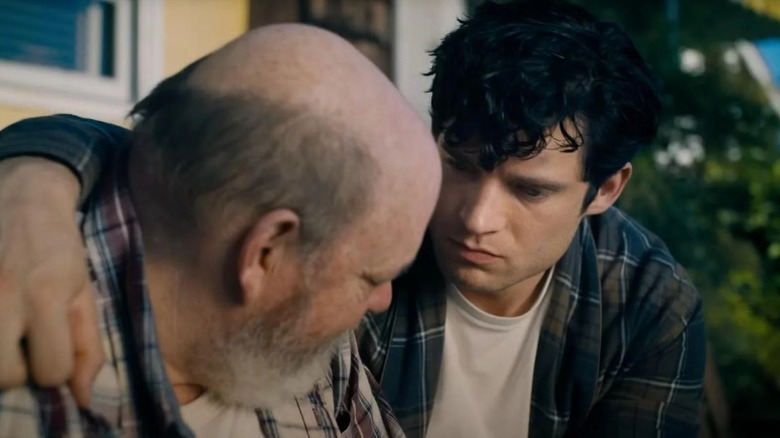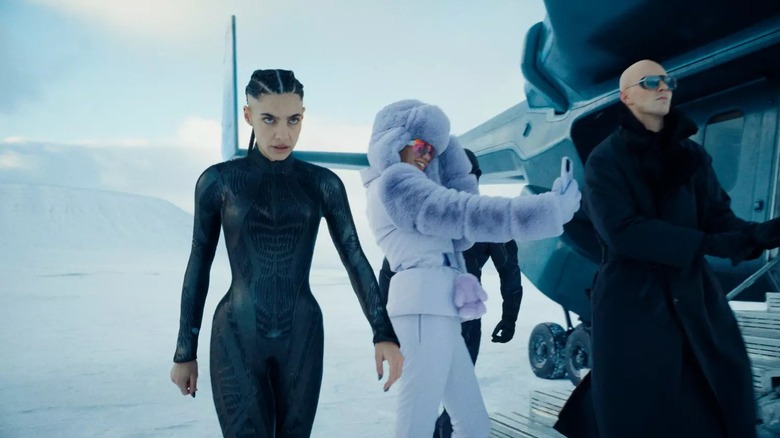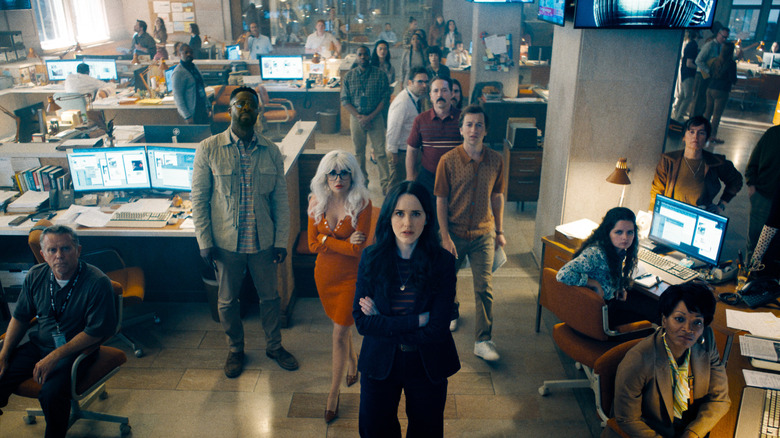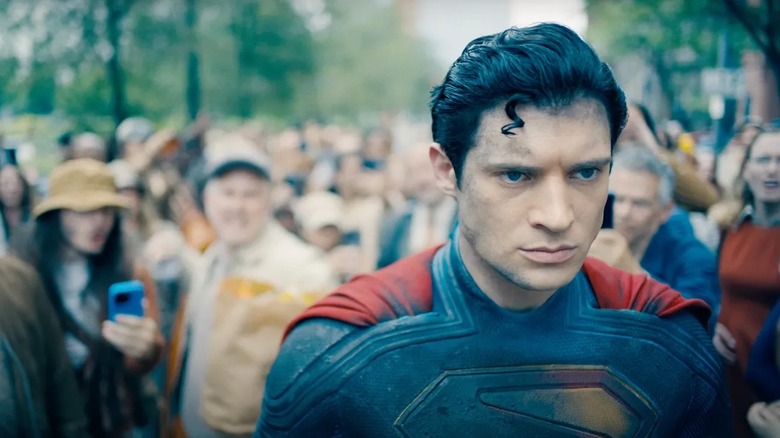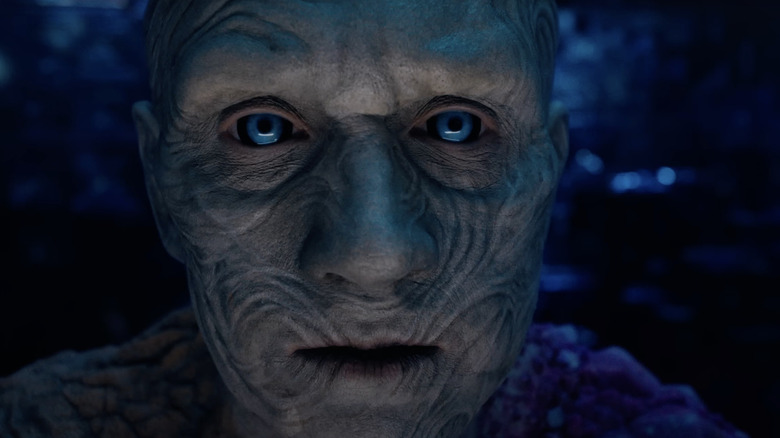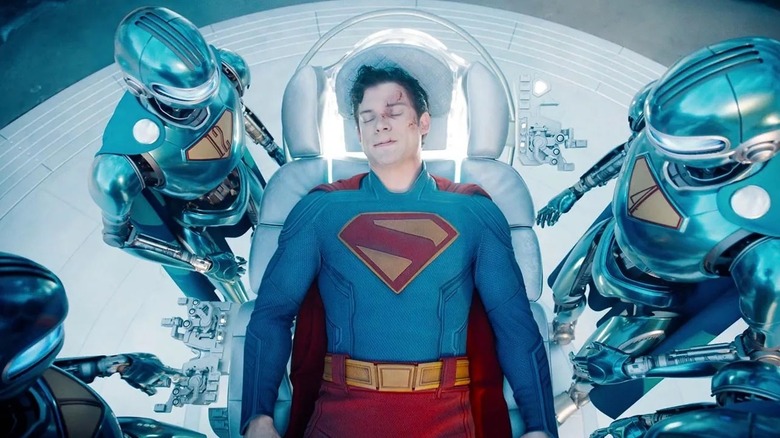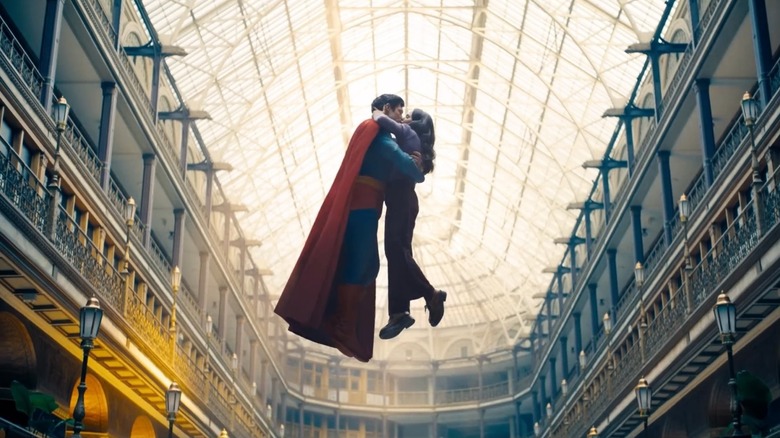7 Things That Worked In James Gunn's Superman (And 3 That Didn't)
To say it's been a while since there was a great Superman movie is an understatement. After the first two excellent Christopher Reeve "Superman" films, Jerry Siegel and Joe Shuster's iconic creation has suffered greatly on the silver screen thanks to all-time duds like "Superman IV: The Quest for Peace." Modern cinematic incarnations of the character haven't fared much better, as movies like "Superman Returns" and "Man of Steel" grappled with figuring out exactly how Superman should look and act in the 21st century.
Thankfully for fans across the globe, James Gunn's "Superman" has landed in theaters everywhere as an exceptionally fun and engaging experience. Unabashedly embracing all the hopefulness and silliness ingrained into the character, the franchise has finally produced a satisfying feature film for the first time since the early '80s.
Director James Gunn's saga of Superman/Clark Kent (David Corenswet) as he navigates issues like his relationship with Lois Lane (Rachel Brosnahan) or his mission on Earth is rife with tremendous artistic virtues. Exploring the things in "Superman" that work especially well showcases a movie that goes the extra mile in providing both spectacle and moving pathos for the viewer. Granted, the exceedingly crowded motion picture also has its share of shortcomings. Three notable flaws in particular stand out as especially egregious missteps in a largely confident production. Exploring what did and didn't work in "Superman" solidifies that this is far from a perfect production, but it doesn't take away from the fact that, in the end, this is a largely enthralling movie worthy of cheers and applause.
Worked: David Corenswet as Superman
Casting director John Papsidera and Gunn were absolutely cooking with their choices for "Superman's" sprawling ensemble cast. From inspired, unexpected appearances by indie cinema artists (like Zlatko Burić from "Triangle of Sadness") to the instantly iconic supporting turns from Edi Gathegi and Sara Sampaio (as Mister Terrific and Eve Teschmacher, respectively), this is a tremendous cast where everyone leaves an impression.
Anchoring the whole thing, though, is David Corenswet in his first major leading man role as Clark Kent/Superman. Not since Christopher Reeve has the character been so perfectly portrayed in live-action. Corenswet is an instantly charming soul, happily leaning into Superman's uber-sincere aura with utmost conviction. He's not playing this as a caricatured joke but, rather, as a layered human being audiences can get invested in.
It's fun to watch Corenswet deftly bob and weave between Superman's most imposing and vulnerable moments. The actor looks incredibly convincing using his heat vision to eliminate hordes of enemy soldiers or flying through the air. However, he's equally believable playing dorky Clark Kent at the Daily Planet or sharing intimate scenes with Pa Kent. Whatever corner of Superman's psyche Corenswet is called upon to portray, he does so with gusto. There's just an innately endearing quality to the actor's screen presence that makes it instantly easy to believe Superman has a genuine affection for all living things. Anyone can swing a punch at CG enemies, but Corenswet's Superman excels because of his soulfulness and tangible humanity.
Worked: The relentless cruelty of Lex Luthor
In recent years, comic book movies have become obsessed with mimicking "Black Panther's" Erik Killmonger and creating their own tragic villains. In the process, productions like "Captain America: Brave New World" have totally misunderstood what made Killmonger work while also failing to commit to truly enjoyably despicable baddies. Huzzah, then, for "Superman" opting to deliver a vision of Lex Luthor (Nicholas Hoult) that's just a nasty creep from the get-go.
There is no sad backstory to justify why Luthor is the way he is, nor any attempt to dial back on how much he relentlessly hates Superman's guts. He's just the worst human being alive, an insufferable liar who's unafraid to hurt dogs or spread lies akin to the racist "Replacement Theory" to secure victory over this Kryptonian refugee. This unabashed wickedness is so fun to watch and fits perfectly into the film's classical atmosphere.
It's also an ambiance that Hoult thrives in as an artist. After delivering a wide range of impressive turns in 2024 films "Juror #2," "The Order," and "Nosferatu," Hoult's Lex reaffirms the actor's range as he delivers a significantly more malicious and contemptuous performance than he's ever given before. Hoult makes no bones about his villain being the most deplorable human being alive. That level of dedication (which he previously applied to radically different roles in movies like "Juror #2") instantly makes him transfixing. Plus, it ensures that his Luthor is more fun to watch than so many other modern comic book movie baddies.
Didn't Work: Elements of the cinematography
The area where "Superman" unquestionably leaves the most potential on the table is in its visuals. While much of the production (the story, performances, music cues, costumes, etc.) dives headfirst into delightfully stylized mayhem, "Superman's" cinematography remains too standard. Gunn and cinematographer Henry Braham (the latter working with the "Guardians of the Galaxy" director for the fifth time) eschew giving this feature an innately heightened look akin to the expressionistic backdrops of Tim Burton's "Batman" films or the wildly imaginative imagery of the "Spider-Verse" titles. Instead, the closest the filming style comes to suggesting a specific personality is in persistent blue and yellow tints in the color grading.
Throughout the movie, certain brightly colored costumes and sets look like the wrong kind of artificial thanks to a combination of oddly bright lighting and digital camerawork. Looking too plastic or unreal isn't a problem with the film's innately stylized sets, but when "Superman" is depicting a grounded location like the halls of a foreign leader's palace, it becomes a pressing issue. Even the default 1.85:1 aspect ratio for non-IMAX showings means that the framing in this feature sometimes lacks specificity rather than the enjoyably precise blocking you'll find in classic comic book panels. These issues mean that "Superman's" cinematography lacks the rest of the film's theatricality.
While the actors and script happily embrace old-school sensibilities, the camerawork and lighting often default to 2020s blockbuster norms. Taking more visual cues from Ang Lee's "Hulk" or the "Spider-Verse" titles would've benefited "Superman" tremendously.
Worked: Pa Kent's big scene with Clark Kent
Unlike most other live-action movie "Superman" incarnations, Jonathan Kent (Pruitt Taylor Vince) survives long enough to see Clark Kent grow into Superman, and his being alive and well after his adopted son has entered adulthood opens up the door for the feature's absolute best scene. Here, Jonathan comes out to his front porch to comfort a downtrodden Clark. The young hero is grappling with the public turning on him and the fact that his beliefs about why he came to Earth in the first place were a lie. This unleashes a quiet sequence where Jonathan remarks to Clark, "Parents aren't good at telling their kids what to do," while also reminding his son, "Parents give their kids the tools they need to make fools of themselves," before reminding Clark how much he loves him.
This profoundly moving interaction is astonishing on many levels. For starters, it's staggering to consider that the man who brought "Slither" to life could also write something so tender and devoid of snark. Vince's performance, meanwhile, is impressive and crucial to making this conversation work. The way he delivers these pearls of wisdom to Clark is riddled with constant moments of brief hesitation and imperfect trail-offs. This isn't a polished speech, and those verbal blemishes poignantly underscore Pa Kent's relatable humanity. He's just an ordinary man trying to remind his son that we all carve out our own destinies. Intimate realism soaks into every frame of this unforgettable tearjerker scene, an interaction that informs the very soul of "Superman."
Worked: The varied dialogue styles
One reason characters like Mister Terrific and Eve Teschmacher are so much fun to watch in "Superman" (in addition to the outstanding performances delivered by their respective actors) is that Gunn's script makes sure every member of this movie's roster has a unique voice rather than writing each "Superman" character as a quip machine. Mister Terrific has a serious style of speaking, while Teschmacher expresses all her perspectives in pronounced terms. Lois Lane and Clark Kent, meanwhile, have strikingly different verbal personas; the former is deeply pragmatic and takes reality as it is, while every word out of Clark's mouth is drenched in eager optimism. These vividly contrasting personalities make the couple's most low-key sequences together so extra compelling.
The variety in oversized personalities seen in "Superman" allowed Gunn to imbue his screenplay with all sorts of fun dialogue, from Guy Gardner/Green Lantern's (Nathan Fillion) smuggest lines to Jimmy Olsen's distinctly bamboozled observations as he navigates LuthorCorp-centric conspiracies. Gunn's consistent knack for humorous discourse in comic book movies really comes alive thanks to how vibrantly rendered these characters are.
Distinctive variations in dialogue really seal the deal in how fun "Superman" is to watch. This isn't a movie where everyone sounds exactly the same; there's range in the verbiage expressed throughout the DC Universe's inaugural motion picture. Best of all, the film's eclectic array of speaking styles makes it a vivid and welcome breath of fresh air compared to earlier Superman titles such as "Superman Returns," where the characters exhibited no personality at all.
Didn't Work: The Daily Planet crew's extraneous climactic role
Gunn's "Superman" script is significantly more invested in weirdo comic book superheroes like Metamorpho than Metropolis' non-superpowered denizens. Specifically, the Daily Planet crew, including Olsen, Perry White (Wendell Pierce), and Cat Grant (Mikaela Hoover), vanish for long stretches of "Superman's" runtime. This only becomes a worrisome detraction to the film, though, during its grand finale.
As Superman dukes it out with Ultraman and Engineer across Metropolis while a dimensional rift splits the city apart, Lois Lane gathers up Olsen, White, Grant, and other Daily Planet personnel into one of Mister Terrific's ships. They're going to publish an exposé on Lex Luthor's true malicious intentions while hovering above a crumbling Metropolis, an awkward subplot seemingly reflecting a struggle to figure out how ordinary Earthling Lois Lane can factor into the film's expansive finale.
Having Clark Kent's work pals (not to mention his principal romantic interest) distinctly removed from all the action is an exceedingly strange decision, especially since these figures are oddly subdued when they see their homes crumble. Plus, these three or four cutaways to Daily Planet employees are so removed from Superman's struggle that it feels like a distraction to keep shifting the film's focus back to them. Surely there was another way to incorporate pivotal "Superman" figures like Lane and Olsen into the motion picture's home stretch. In a dazzling finale delivering gripping comic book mayhem, the awkward inclusion of these Metropolis denizens is an unfortunate misstep.
Worked: A story that functions as a standalone movie
"Superman's" opening text establishes that the introduction of Metahumans to planet Earth 300 years ago established "a new age of Gods and Monsters," a line that references the name of the DC Universe's first chapter. Given that Gunn's script immediately acknowledges an obscure piece of DC Universe lore, one could be forgiven for worrying that the ensuing film would be just a deluge of teases and set-ups for further entries in this franchise. Happily, "Superman" is instead a largely standalone creation content to give audiences one crowd-pleaser movie. Additional superheroes like Hawkgirl, Metamorpho, and Mister Terrific all serve very concrete purposes within this story. In a welcome departure from recent superhero movies like "Ant-Man and the Wasp: Quantumania," nobody's plotlines feel awkwardly and intentionally unresolved so that some upcoming HBO Max program can carry their narrative to the finish line.
Even "Superman's" ending eschews Darkseid or Brainiac teases in favor of poignancy that firmly pays off pre-established story and character beats. This approach even extends to the two quick scenes playing during the film's credits, neither of which double as trailers for upcoming DC Universe projects. They're just glimpses into the everyday existence of these endearing crime-fighters. These immediate pleasures are common in the history of summer blockbusters but have gotten lost in the shuffle of modern superhero movies that are too concerned with teasing Black Knight's MCU arrival or George Clooney's Batman's comeback. As a result, "Superman" excels as an exquisitly fun time rather than a DC Universe promo reel.
Didn't Work: Realizing Baby Joey as a CG creation
The initially aloof Metamorpho (Anthony Carrigan) is revealed in "Superman" to be a reluctant minion of Lex Luthor thanks to the scheming billionaire kidnapping his green-skinned son, Joey. If the Element Man doesn't do everything that Luthor demands, Joey could be killed by one of this villain's henchmen. Unfortunately, Joey appears on screen as an exclusively CG creation with distractingly smooth skin. Given that Metamorpho is brought to life through incredible makeup effects and the film's general dearth of humanoid CG characters, Joey being a fully digital creation is a weird choice. Putting a baby in extensive prosthetics or a mo-cap suit was obviously a no-go, but why couldn't Joey have been a puppet, like "Hellboy II: The Golden Army's" "baby"/tumor?
Joey is meant to immediately garner audience sympathy — but he just looks like a plastic version of one of Shrek's kids. It doesn't help that his design is too cutesy for his own good; the character needed a bit more ugliness and jagged visual qualities to be truly endearing. As it stands, Metamorpho's pride and joy seems distractingly ready to be turned into a Beanie Baby or Funko Pop!. Relying just on a digitally rendered infant undercuts the emotional tension of scenes where Superman protects the tyke. Plus, leaning on a CG baby teeters "Superman" dangerously close to repeating the mistakes of recent DC movie misfires. After all, didn't "The Flash" prove the downsides of digital infants?
Worked: John Murphy and David Fleming's score
Between "Sinners" and "Superman," it's been a great year for electric guitars in film music. John Murphy and David Fleming's "Superman" score is surprisingly dynamite, especially considering his "Guardians of the Galaxy Vol. 3" score was a bit underwhelming. Collaborating with Fleming and working with Superman's heightened world, though, has brought out Murphy's best. There's real verve and weight to the electric guitar-heavy tracks, which thankfully don't lapse into becoming the musical equivalent of, "This isn't your grandma's Superman!" Instead, the use of the instrument infuses the soundtrack not with apologetic edginess but with a musical echo of Superman's ceaseless conviction to do the right thing. The terrifically rousing "Speeding Bullet," for instance, emanates a soaring vivacity associated with classic images of Superman blazing across the sky.
The "Dosti-"like energy fueling "Speeding Bullet" appears throughout these tremendously invigorating pieces, while others oscillate between different auditory personalities. "Justice Gang vs. Kaiju" in particular reflects this quality, its composition sometimes evoking Hans Zimmer tracks before dovetailing into zippier attributes that reflect on-screen moments like a big beast's eye getting poked. Best of all, tracks like "Raising the Flag" exemplify the sense of musical theatricality befitting of this blockbuster. Most memorably on "Flag," the rendition of the "Superman" theme initially plays against an empty backdrop before getting bigger and more hopeful. Granted, nothing in this soundtrack comes close to topping John Williams' "Superman" compositions, but Murphy and Fleming nonetheless make a terrific duo in their "Superman" musical exploits.
Worked: Superman's ultra-sincere atmosphere
Sincerity oozes out of every ounce of "Superman." This is a production that wears its heart on its sleeve, from Gunn and company's clear affinity for colorful classic superhero costumes to the script's plea for cooperation across humanity to the story's moments of genuine poignancy. And, for those heading to the theater to see some big-screen action, this inaugural DC Universe movie also delivers on that front.
However, there's a relentless compassion throughout the proceedings that proves to be truly moving. "You see the beauty in everyone," Lois Lane remarks to Clark Kent at one point, a comment that might as well be the feature's entire thesis statement. Gunn's handling of "Superman's" various inhabitants radiates affection, whether it's oddball-looking aliens or small children and squirrels in danger. The director's infectious zeal for these characters is impossible to resist, especially when paired with a slew of engaging performances.
Committing to this kind-hearted attitude with nary any snark in sight makes "Superman's" spectacle and emotions sing. With no creative self-consciousness to make the movie trip over its own feet, there's more time for glorious moments of Pa Kent connecting with his son, Lois and Clark locking lips, and Krypto triumphantly coming to save his master just in the nick of time. Best of all, this sincerity is a welcome breath of fresh air from recent, irony-drenched superhero features like "Deadpool & Wolverine" and "Black Adam." "Superman's" soulfulness and compassion both perfectly fit its titular character and ensure this project offers something new in the modern blockbuster landscape.
